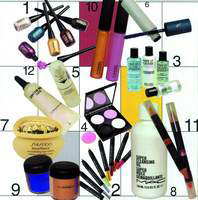Be careful when using cosmetics
 Most skin care and beauty care products (shaping) contain 15-20 different chemicals, including insoluble heavy metals, accumulate in cell membranes such as mercury. , lead, zinc, cyanure.
Most skin care and beauty care products (shaping) contain 15-20 different chemicals, including insoluble heavy metals, accumulate in cell membranes such as mercury. , lead, zinc, cyanure.
Sunlight causes melasma, monsoon dry skin, hot temperature makes burns and melasma and polluted water, causing inflammation and acne . In addition, skin is also destroyed because of America products, that is due to:
Ingredients contain too high levels of toxins that skin cells cannot tolerate
Most skin care and styling products contain insoluble heavy metals, easily accumulate in cell membranes such as mercury, lead, zinc, and cyanure. Even glycine, the most basic chemical used quite commonly in the cosmetics industry, has about 10 categories with a purity of 96 to 99.9%. The type of less pure glycérine made from petrochemical technology, the price is only 1 / 5-1 / 7 kind of extract from coconut oil or palm oil (about 345 USD / ton compared to 1,800-2,600 USD / ton). They contain a lot of impurities, so it is inevitable for consumers to be catastrophic.
With makeup or lipstick is similar: talc powder, pigments with a high content of toxins (lead), flavorings (alcohol, aldehyde) easily cause allergies, especially melasma, skin ulcers.
Active ingredients used in cosmetics cause complications
In addition to the basic material for emulsifying cream or foaming with surfactant, manufacturers often add some active ingredients to "soften" or "white skin" like fake smoothing wax. Create, honey to peel off the layer of keratinocytes covered on the epidermis, or the antibacterial, exfoliants like corticosteroids, hydroquinone make the skin peel, blister and sometimes burnt.
There are even moisturizers that add antibiotic active ingredients or anesthetics to make the "beauty" effect fast. Since the 1970s, in order to avoid complications and reactions of the body, advanced manufacturers have tried to return to active ingredients from nature, herbs or vitamins from biotechnology. They have a good permeability that is easily compatible with cells, while limiting skin irritation (avoiding causing antibodies to resist - anaphylactic shock).
Technological process does not guarantee hygiene, infection and mold
The famous Pola cosmetics manufacturer in Japan said "nothing is as easy as making ice cream, but the hardest is this profession" when he described the first step in cosmetics production. Pola went from a fruit grinder to cause an emulsifying reaction for ice cream in the kitchen.
Of course Pola could not succeed in this way and discovered that "all follow the recipe but the cream is still sour and easy to rot". The process of producing cosmetics is quite strict, it does not stop at "weighing, measuring, measuring" accurately but also checking microbiological bacteria, pressure, temperature and tight time in the lab. .
Many creams are moldy and contaminated in production as well as during customer use (by hand rubbing cream from dirty bottles .) and causing waterlogging, mortar or rot, grease and water in dissociated ice cream, cannot continue to use.
Sensitive skin cannot adapt to "strange substance"
Many people have skin that is incompatible (or adaptable) to cosmetic "substances" (chemicals), is prone to allergies (redness, irritation, itchiness) to any cream. Therefore, the right manufacturers must test the allergy before launching their products to the market, and specify "products that have been tested allergy" or "allergy-free" and accompanied with advice stop using immediately when you feel uncomfortable.
In developed countries, the production licensing agency (Ministry of Health) forces producers to provide adequate data on the ingredients and active ingredients, and some regulate binding of both content. Clinical results such as the case of AHA (Alpha Hydroxy Acid - fruit extract, a common skin bleaching agent) should not exceed 2% to avoid complications.
The US Food and Drug Administration also forced manufacturers to report on the results of raw material analysis, preventing "mock" goods with unsatisfactory materials to protect customers' interests. to the highest level.
On the consumer side, carefully select and try on your skin before choosing to buy a certain product and check the expiry date and license (visa) of the Ministry of Health.
- Instructions on how to distinguish the most real and fake cosmetics
- Instructions for viewing the shelf life of cosmetics
- Where do men have to use their own cosmetics?
- Nanoparticles in cosmetics are harmful to the environment
- The risk of serious allergies from cosmetics
- Beauty should be careful when using cosmetics containing peppermint
- Women with premature menopause due to makeup
- Risk of skin cancer from some cosmetics
- America has found a way to turn plastic waste into cosmetics
- Common misconceptions about lead in lipstick
- The Ministry of Health warns about drugs and cosmetics containing suspected cancer
- Women who use brown cosmetics are at risk of infertility
 Green tea cleans teeth better than mouthwash?
Green tea cleans teeth better than mouthwash? Death kiss: This is why you should not let anyone kiss your baby's lips
Death kiss: This is why you should not let anyone kiss your baby's lips What is salmonellosis?
What is salmonellosis? Caution should be exercised when using aloe vera through eating and drinking
Caution should be exercised when using aloe vera through eating and drinking